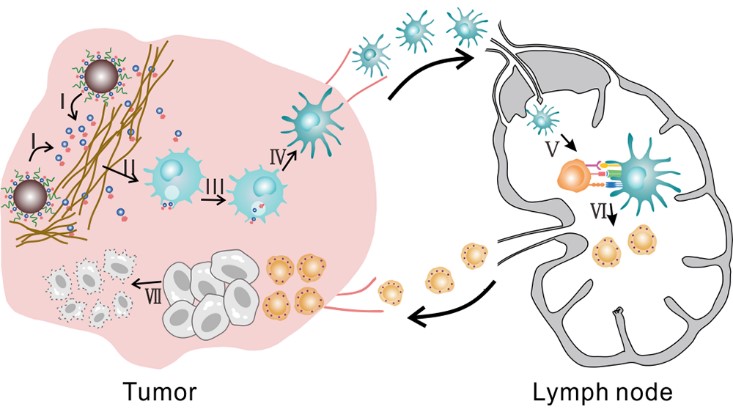Cancer vaccines are effective immunotherapy aiming to elicit antitumor immune immunity. Tumor-infiltrating dendritic cells (TIDCs) are mostly immature and immunosuppressive, usually mediating immune inhibition. Effectively activating TIDCs for augmenting the desired antitumor immune responses is crucial for successful anticancer vaccines. Utilization of cytosine-guanine oligodeoxynucleotides (CpG ODNs) to stimulate the activation of TIDCs has been demonstrated to be effective for improving antitumor immunity.However, a series of biological barriers has limited the efficacy of previous nanocarriers for delivering CpG to TIDCs.
To address this problem, the Research Group for Nanomedicine and Biomaterials of South China University of Technology developed a dual-sensitive dendrimer cluster-based nanoadjuvant for delivering CpG ODNs into TIDCs. The tumor acidity triggers the rapid release of CpG conjugated polyamidoamine (PAMAM) dendrimers from the nanoadjuvant, thus facilitating its perfusion deep into tumor and phagocytosis by TIDCs. Thereafter, the reductive condition of the endolysosomes led to the subsequent release of CpG, which promotes the DCs activation and enhances antitumor immunotherapies. The results demonstrated that the nanoadjuvant contributed to the robust DCs activation and increased cytotoxic T lymphocyte infiltration in tumors and TDLNs, resulting in significant tumor growth inhibition. In addition, the programmable delivery of CpG ODNs by nanoadjuvant improved current cancer immunotherapies including immunogenic cell death inducer or immune-checkpoint blockade. Programmable delivery of immune adjuvant efficiently overcomes the barriers for targeted delivery to TIDCs, and provides a promising strategy for improving cancer immunotherapy.
The research published in Nano Letters, entitled Programmable delivery of immune adjuvant to tumor-infiltrating dendritic cells for cancer immunotherapy. The full text link: https://pubs.acs.org/doi/10.1021/acs.nanolett.0c00893.

The first authors of this paper are Dr. Jing Liu and Dr. HongjunLi, South China University of Technology. Professor Jun Wang is the corresponding author of this paper. The research was supported by the Ministry of Science and Technology, the National Natural Science Foundation of China, the Chinese Academy of Sciences, the Program for Guangdong Introducing Innovative and Entrepreneurial Teams and the Young Elite Scientists Sponsorship Program by CAST.
